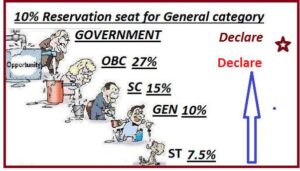
#Educational Reservations #Supporting #Diversity #Equal Access to #Education
Education is frequently seen as the foundation of both social mobility and personal development. However, historically, access to high-quality education has been restricted for underprivileged and marginalized people, which has contributed to socioeconomic inequality. Numerous nations have put in place educational reservation measures to remedy this discrepancy. By setting aside seats or quotas in educational institutions, these policies seek to give underrepresented groups opportunity and representation. We will explore the idea of educational reservations, their goals, and their effects on encouraging diversity and equal access in education in this blog post.
Historical Background and Justification
The reasons behind reservations in education are historical wrongdoings, prejudice, and societal hierarchy that have marginalized some individuals. These groups’ educational growth has been limited by discrimination based on caste, race, gender, and socioeconomic status.
To address ongoing inequities and build a more equitable society, educational reservations were developed.
Objectives and Implementation
Making sure everyone has equal access to educational opportunities is the main goal of educational reservations. Institutions might designate a specific portion of openings for people from marginalized populations by reserving seats or quotas. This contributes to levelling the playing field and gives these people the opportunity to pursue education and improve their socioeconomic circumstances.
The way that educational reserves are implemented differs between nations and areas. Certain nations, such as India, have reservation policies for its Scheduled Castes (SC) and Scheduled Tribes (ST) that are based on caste. Other countries use programmed that are directed at specific marginalized groups or socioeconomic underachievement. Reservations may be made for institutions receiving government funding, such as colleges, universities, or specialty courses.
Benefits and Impact
Educational reservations have had a significant impact on society by fostering diversity and inclusivity in educational institutions. Here are some key benefits and impacts:
- Equal Opportunity: Educational reservations enable underprivileged groups to receive equal opportunity to pursue education by overcoming historical impediments. This encourages social advancement and gives people the ability to escape poverty cycles.
- Representation: Educational institutions become more reflective of society by ensuring representation from a variety of backgrounds. This not only improves the learning atmosphere but also encourages pupils to comprehend and empathies with people from different cultures.
- Education reservations: It provide people from disadvantaged communities more power, enhancing their confidence and self-esteem. They are given the knowledge and skills necessary to succeed in the labor market and make substantial contributions to society thanks to access to high-quality education.
- Social Cohesion: Through educational events, people from all backgrounds communicate, share knowledge, and grow to respect one another. By eradicating any stereotypes and prejudices that may exist among various communities, this promotes social cohesion.
- Economic Development: Educational reservations help a country’s economy as a whole. Societies may tap into the potential talent and abilities of a larger population by offering education to underprivileged groups, which fosters innovation and economic progress.
Criticism and Challenges
Despite its benefits, educational reservations have come under fire and suffered difficulties. Some contend that these regulations could undercut merit-based hiring and lower academic standards. There are worries that people who do not belong to the targeted underprivileged groups may take advantage of the reservations. Additionally, certain groups in society may occasionally object to or oppose the implementation of reservations.
Conclusion
The promotion of diversity and fair access in education is greatly aided by educational reservations. These policies allow social mobility by addressing historical and systemic obstacles experienced by excluded communities. Beyond empowering individuals, educational reservations foster social solidarity and contribute to the general advancement of society. To make sure that these policies are implemented successfully and take into account the changing needs of the communities they are meant to uplift, it is crucial to continuously assess and improve them. By using a fair and inclusive approach








































